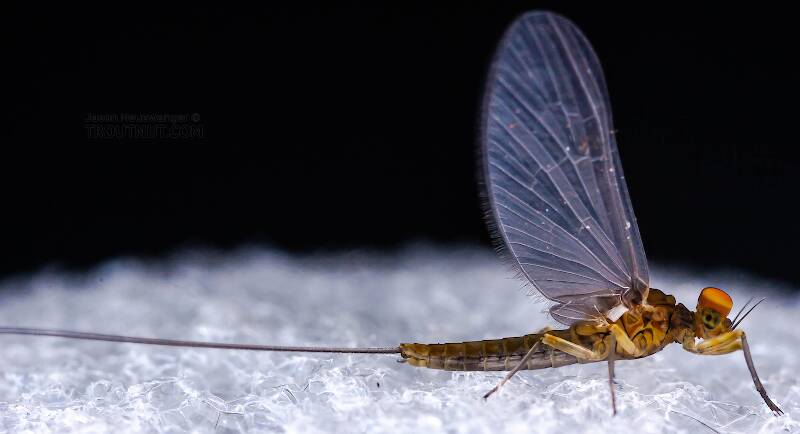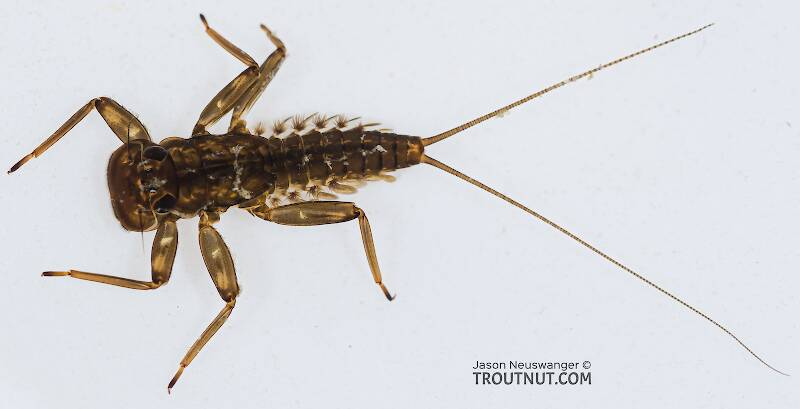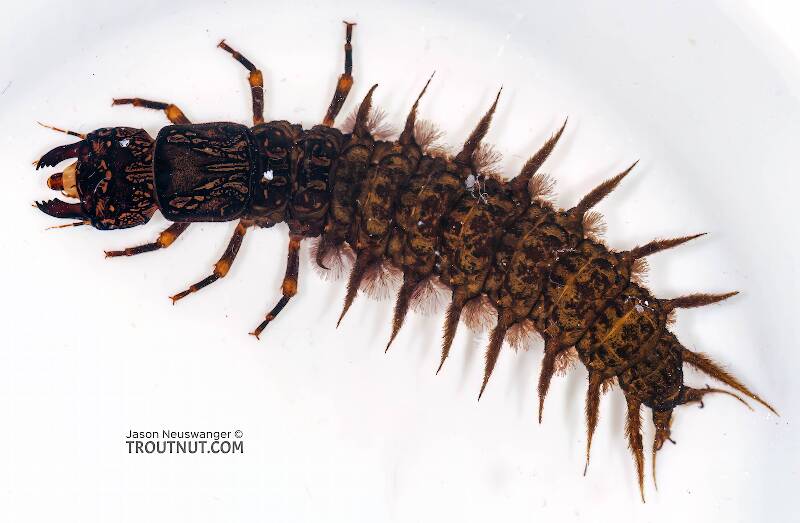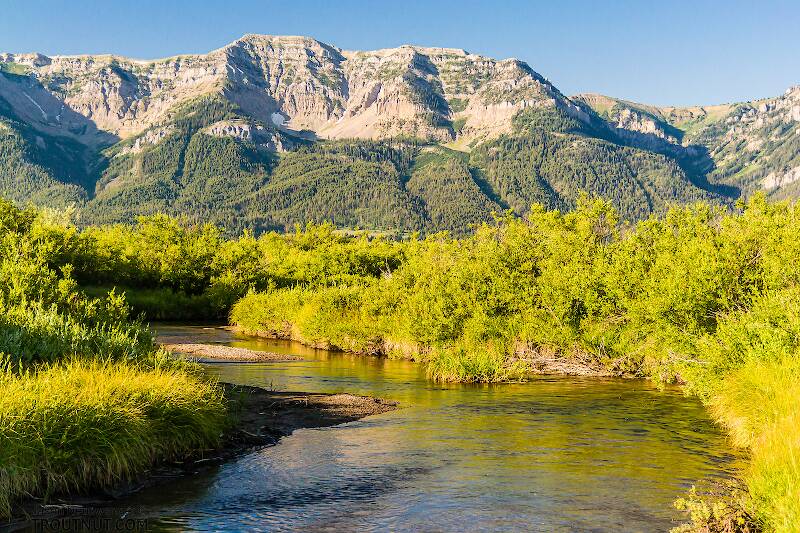
Blue-winged Olives
Baetis
Tiny Baetis mayflies are perhaps the most commonly encountered and imitated by anglers on all American trout streams due to their great abundance, widespread distribution, and trout-friendly emergence habits.
Featured on the forum

This specimen keys to the Epeorus albertae group of species. Of the five species in that group, the two known in Washington state are Epeorus albertae and Epeorus dulciana. Of the two, albertae has been collected in vastly more locations in Washington than dulciana, suggesting it is far more common. On that basis alone I'm tentatively putting this nymph in albertae, with the large caveat that there's no real information to rule out dulciana.

Troutnut is a project started in 2003 by salmonid ecologist Jason "Troutnut" Neuswanger to help anglers and
fly tyers unabashedly embrace the entomological side of the sport. Learn more about Troutnut or
support the project for an enhanced experience here.
Hellgrammite Genus Corydalus (Dobsonflies)

Where & when
In 181 records from GBIF, adults of this genus have mostly been collected during June (17%), July (17%), August (16%), May (14%), September (11%), and March (6%).
In 63 records from GBIF, this genus has been collected at elevations ranging from 10 to 8196 ft, with an average (median) of 3133 ft.
Specimens of the Hellgrammite Genus Corydalus
1 Larva
Discussions of Corydalus
Dobson Fly
26 replies
Posted by Jesse on Jun 23, 2011
Last reply on Sep 12, 2013 by PaulRoberts
What can anyone tell me about the Dobson Fly?
(General now guys, we don't have to go all scientific with it ha)!
(General now guys, we don't have to go all scientific with it ha)!
Northern Delaware River - Hellgramite Goldmine
2 replies
Posted by Yemoss on May 29, 2007
Last reply on Jul 22, 2007 by GONZO
Far from a fly-fisherman, I still wanted to identify a menacing- looking insect which invaded our late-night campfire council this past Memorial Day Weekend in Millford, PA on the Delaware River (cr 206 n). We stayed at Kittatiny Canoe Campgrounds, very commercial, but made the best of it. The amount of these bugs crawling around at night, lured by our glowing fire, was incredible. Today I identified them as Hellgramites, and also learned that they are prized by bass and trout. Didn't even think to bring a pole with the short weekend - we went rafting instead. Still wanted to inform fellow fisherman of the abundance and location of this critter. Important to note that our sites bordered the river - one website I read indicated that Hellgramites won't go more than 50 yards inland from their water source; I'm not sure if that's common to most aquatic species but I'd imagine so.
Hellgrammite hell
1 replies
Posted by Sprattoo on Jun 5, 2007
Last reply on Jun 5, 2007 by Wiflyfisher
The First time I saw one of these things was as a kid. We were playing around a woolen mill in old Kezar Falls Maine.
Turning over a damp old pile of wool revealed a number of adult Hellgrammites. At the age of 12 or 13 these were the scariest things I had ever seen.... still very intimidating. I remember trying to get them to bite sticks and my shoe... which they happily did once I started poking them.
Now at the age of thirty *mumble mumble* This insect has come into my life again.
After opening my little tackleshop and selling flies and gear for about a year, it was an embarrassment that I couldn't catch the Browns surfacing all over the place down on the river.
I finally got one by accident, cut open its belly and found... thats right... A dobsonfly nymph.
Although I believe they were really feeding on dragonfly or damselfly nymphs (as they were chasing and feeding near the top)
The story of my trouts belly told a different tale.
Some time at the tying bench, with a few pieces of yarn and marabou and now those old browns are no problem at all!
Turning over a damp old pile of wool revealed a number of adult Hellgrammites. At the age of 12 or 13 these were the scariest things I had ever seen.... still very intimidating. I remember trying to get them to bite sticks and my shoe... which they happily did once I started poking them.
Now at the age of thirty *mumble mumble* This insect has come into my life again.
After opening my little tackleshop and selling flies and gear for about a year, it was an embarrassment that I couldn't catch the Browns surfacing all over the place down on the river.
I finally got one by accident, cut open its belly and found... thats right... A dobsonfly nymph.
Although I believe they were really feeding on dragonfly or damselfly nymphs (as they were chasing and feeding near the top)
The story of my trouts belly told a different tale.
Some time at the tying bench, with a few pieces of yarn and marabou and now those old browns are no problem at all!
Start a Discussion of Corydalus
References
Hellgrammite Genus Corydalus (Dobsonflies)
Taxonomy
3 species (Corydalus cornutus, Corydalus lutea, and Corydalus texana) aren't included.

